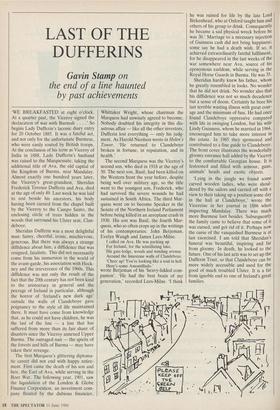LAST OF THE DUFFERINS
Gavin Stamp on the end of a line haunted by past achievements WE BREAKFASTED at eight o'clock. At a quarter past, the Viceroy signed the declaration of war with Burmah . .' So begins Lady Dufferin's laconic diary entry for 20 October 1885. It was a fateful act, and not only for the unfortunate Burmese, who were easily routed by British troops. At the conclusion of his term as Viceroy of India in 1888, Lady Dufferin's husband was raised to the Marquessate, taking the additional title of Ava, the old capital of the Kingdom of Burma, near Mandalay. Almost exactly one hundred years later, the Viceroy's great-grandson, Sheridan Frederick Terence Dufferin and Ava, died at the age of only 49. Last week he was laid to rest beside his ancestors, his body having been carried from the chapel built by the Viceroy to the Campo Santo, the enclosing circle of trees hidden in the woods that surround his Ulster seat, Clan- deboye.
Sheridan Dufferin was a most delightful man: funny, cheerful, ironic, mischievous, generous. But there was always a strange diffidence about him, a diffidence that was resigned, fatalistic. This did not necessarily come from his immersion in the world of the avant-garde, his association with Hock- ney and the irreverence of the 1960s. This diffidence was not only the result of the fact that the 20th century has not been kind to the aristocracy in general and the peerage of Ireland in particular, although the horror of Ireland's new dark age' outside the walls of Clandeboye gave poignancy to the style of life maintained there. It must have come from knowledge that, as he could not have children, he was the last of the line — a line that has suffered from more than its fair share of disasters since the Viceroy annexed Upper Burma. The outraged flats — the spirits of the forests and hills of Burma — may have taken their revenge.
The first Marquess's glittering diploma- tic career did not end with happy retire- ment. First came the death of his son and heir, the Earl of Ava, while serving in the Boer War. The following year, 1901, saw the liquidation of the London & Globe Finance Corporation, an investment com- pany floated by the dubious financier, Whittaker Wright, whose chairman the Marquess had unwisely agreed to become. Nobody doubted his integrity in this dis- astrous affair — like all the other investors, Dufferin lost everything — only his judg- ment. As Harold Nicolson wrote in Helen's Tower, 'He returned to Clandeboye broken in fortune, in reputation, and in health.'
The second Marquess was the Viceroy's second son, who died in 1918 at the age of 50. The next son, Basil, had been killed on the Western front the year before, despite being well over military age, so the title went to the youngest son, Frederick, who had survived the severe wounds he had sustained in South Africa. The third Mar- quess went on to become Speaker in the Senate of the Northern Ireland Parliament before being killed in an aeroplane crash in 1930. His son was Basil, the fourth Mar- quess, who so often crops up in the writings of his contemporaries: John Betjeman, Evelyn Waugh and James Lees-Milne.
I called on Ava. He was packing up For Ireland, for the scintillating lake, His gate-lodge, woods and winding avenue Around the limestone walls of Clandeboye. 'Cheer up! You're looking like a soul in hell. Here's some Amontillado.'
wrote Betjeman of his 'heavy-lidded com- panion'. 'He had the best brain of my generation,' recorded Lees-Milne. I think he was ruined for life by the late Lord Birkenhead, who at Oxford taught him and others of his group to drink. Consequently he became a sad physical wreck before he was 30.' Marriage to a necessary injection of Guinness cash did not bring happiness; some say he had a death wish. If so, it achieved extraordinarily fateful fulfilment, for he disappeared in the last weeks of the war somewhere near Ava, source of his eponymous earldom, while serving in the Royal Horse Guards in Burma. He was 35.
Sheridan hardly knew his father, whom he greatly resembled in looks. No wonder that he did not drink. No wonder also that his diffidence was not so much decadence but a sense of doom. Certainly he bore his last terrible wasting illness with great cour- age and the minimum of fuss. He had once found Clandeboye oppressive compared with life in swinging London, but his wife Lindy Guinness, whom he married in 1964, encouraged him to take more interest in the estate. In 1985 they sponsored and contributed to a fine guide to Clandeboye. The front cover illustrates the wonderfully gloomy entrance hall added by the Viceroy to the comfortable Georgian house. It is festooned and filled with armour, guns, animals' heads and exotic objects.
'Lying in the jungle we found some carved wooden ladies, who were shoul- dered by the sailors and carried off with a view to their taking up a position some day in the hall at Clandeboye,' wrote the Vicereine in her journal in 1886 when inspecting Mandalay. There was much more Burmese loot besides. Subsequently the family came to believe that some of it was cursed, and got rid of it. Perhaps now the curse of the vanquished Burmese is at last exorcised. I am told that Sheridan's funeral was beautiful, inspiring and far from gloomy. In death, he looked to the future. One of his last acts was to set up the Dufferin Trust, so that Clandeboye can be more widely accessible and used for the good of much troubled Ulster. It is a far from ignoble end to one of Ireland's great families.


































































 Previous page
Previous page